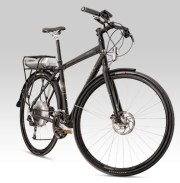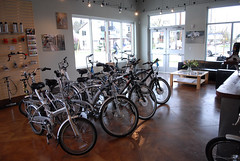At the recent Consumer Electronics Show in Las Vegas, a new hybrid electric bike from Sanyo stole the show. The Eneloop model made lots of headlines (Treehugger called it a “game-changer” and it even made it’s way into the Business section of the New York Times), leading reasonable people to wonder — could 2010 be the year of the e-bike in America?
Given that bike product trends often start here (dutch city and cargo bikes and Electra’s Ticino to name a few), it will be interesting to see if Portland becomes the first U.S. city to embrace e-bikes.
Last week, Sanyo’s North American Business Development Manager Alex Kelley was in Portland to show off the Eneloop. He was also in town to scout locations for solar charging stations they plan to install in Portland in the coming months. Acknowledging that e-bikes have their detractors, Kelley wrote me via email: “I know that e-bikes aren’t a product for everyone, but we feel that anything that helps get people out of their cars and onto the bike paths is a good thing.”
“My best customers are folks who live thoughtfully and can easily understand how an electric bicycle can help them live their values more fully.”
— Wakefield Gregg, owner of The eBike Store
Portland saw the opening of two electric bike retail outlets in 2009. Wakefield Gregg opened The eBike Store last spring and German-made Kalkhoff Bikes opened up a U.S. distribution and retail outlet in the Pearl District.
According to The eBike Store owner Wakefield Gregg, consumers might gain awareness of e-bikes in 2010, but we’re not quite at the “tipping point” stage yet. “Only a small percentage of folks will see how an e-bike could fit their lifestyle and be willing to commit to purchasing a $1100-$4000 bike.”
Greg tells me his business (which isn’t even a year old yet) has been steady. “Between bike sales, bike conversions and service work, we have been Top Ramen profitable every month except November.”
As for the buzz and excitement around e-bikes, Greg says he’d rather avoid the hype:
“This may sound funny, but I don’t like to sell e-bikes to folks who are excited. I know it goes against every sales book ever written, but my best customers are folks who live thoughtfully and can easily understand how an electric bicycle can help them live their values more fully.”
Industry leaders like Trek and Giant have invested heavily in the e-bike market, battery technology is improving rapidly, and the entry of a global electronics juggernaut like Sanyo will help drive down prices. But there are still barriers to e-bikes cracking the American market.

Because bike culture in America (for better or worse) is rooted in Lance-type performance and speed, and not utility like most other countries, e-bikes suffer from an image problem. “They’re not bikes!” is a common refrain from dyed-in-the-wool riders. There almost seems to be a stigma to having a motor help you out. As if it’s an assault on the purity of the bicycle that has helped stoke the fixed-gear bike craze.
Beyond image, there are concerns of how these new-fangled machines will mix with old-school pedal pushers in bike lanes.
State law currently limits “electric assisted bicycles” to 20 mph, which is easy to do with a conventional bike, but still pretty fast for dense urban riding conditions (regular speeds downtown are 12-15 mph). According to Oregon statute, an electric assisted bike is considered a bicycle, unless specifically noted otherwise. Oregon law also states that e-bikes must have fully operational pedals for human propulsion and a motor with output not greater than 1,000 watts.
A bill introduced in Salem in 2009, Senate Bill 420, sought to incrase the speed limit for electric assisted bikes to 35 mph and allow motors up to 5 horsepower (about 3,800 watts).
The eBike Store owner Gregg opposed the legislation, saying electric mopeds are fine and all, “But don’t call them e-bikes or let them into the bike lanes where they could injure others.” Ultimately, the bill died in committee before even being voted on.
Another barrier for e-bikes is that the type of people they’re marketed to are precisely the folks who feel riding a bike is too dangerous. Our current lack of a connected, separated, and comfortable bike network makes many people afraid to even try biking — and simply giving them a motor won’t change their mind.
Love them or hate them, electric bikes are here to stay. As designs and technology improve and cost comes down, the stigma will likely wash away and someday we’ll wonder how we ever got around without them. And besides, wouldn’t you rather share the road with an electric bike instead of an electric car?
What do you think about electric bikes? Will 2010 be the year of the e-bike in America?



